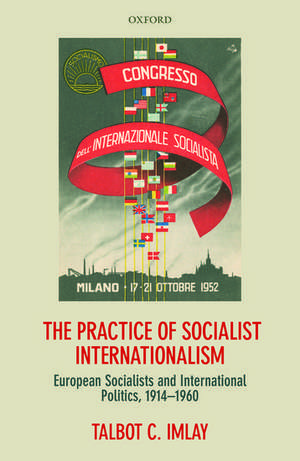The Practice of Socialist Internationalism: European Socialists and International Politics, 1914-1960
Autor Talbot Imlayen Limba Engleză Hardback – 14 dec 2017
Preț: 765.59 lei
Preț vechi: 1095.51 lei
-30% Nou
Puncte Express: 1148
Preț estimativ în valută:
146.52€ • 152.56$ • 123.83£
146.52€ • 152.56$ • 123.83£
Carte tipărită la comandă
Livrare economică 27 februarie-05 martie
Preluare comenzi: 021 569.72.76
Specificații
ISBN-13: 9780199641048
ISBN-10: 0199641048
Pagini: 496
Dimensiuni: 164 x 242 x 34 mm
Greutate: 0.88 kg
Editura: OUP OXFORD
Colecția OUP Oxford
Locul publicării:Oxford, United Kingdom
ISBN-10: 0199641048
Pagini: 496
Dimensiuni: 164 x 242 x 34 mm
Greutate: 0.88 kg
Editura: OUP OXFORD
Colecția OUP Oxford
Locul publicării:Oxford, United Kingdom
Recenzii
By virtue of his archival research in twelve countries he has succeeded in producing an essential starting point for future students of these subjects who can regard this book as a reliable guide to the exchange of views between the parties concerned on many of the big issues of the period, such as the 1919 peace settlement, the Ruhr crisis of 1923, the Dawes Plan, European security, Imperialism and decolonization, European unity and the Cold War.
The book thus forms a new standard work on socialist internationalism and will prove important in re-assessing the role of international socialism, and internationalism more generally, in the forging of European international politics.
This study -- supported by the author's extraordinary command of the literature and primary materials, and his sharp and persistent focus on key themes of socialism, internationalism, and international politics -- concentrates on the British Labour Party and the German and French socialist parties. Revival of international contacts during this war, bitter divisions on the Left in its aftermath, and the defection of many socialists to communism led socialists to renew international commitment and organization in the early 1920s. The account of this renewal is a particularly significant contribution, as is the discussion of socialist internationalism after 1945 and through the 1950s. Remarkable throughout is the relevant documentation, especially from volumes of correspondence archived in 12 countries ... Highly recommended.
Talbot C. Imlay's The Practice of Socialist Internationalism is a reminder of the need to think about internationalism in the plural, and the fact that capturing this pluralism requires crossing national and historiographical borders. Based on dazzling archival research in a dozen countries, the book draws from personal papers and party collections from Ottawa to Oslo and across Europe. The historiographical treatment is also wideranging, as is the thematic range. This means that the book can be read in a number of ways.
The book thus forms a new standard work on socialist internationalism and will prove important in re-assessing the role of international socialism, and internationalism more generally, in the forging of European international politics.
This study -- supported by the author's extraordinary command of the literature and primary materials, and his sharp and persistent focus on key themes of socialism, internationalism, and international politics -- concentrates on the British Labour Party and the German and French socialist parties. Revival of international contacts during this war, bitter divisions on the Left in its aftermath, and the defection of many socialists to communism led socialists to renew international commitment and organization in the early 1920s. The account of this renewal is a particularly significant contribution, as is the discussion of socialist internationalism after 1945 and through the 1950s. Remarkable throughout is the relevant documentation, especially from volumes of correspondence archived in 12 countries ... Highly recommended.
Talbot C. Imlay's The Practice of Socialist Internationalism is a reminder of the need to think about internationalism in the plural, and the fact that capturing this pluralism requires crossing national and historiographical borders. Based on dazzling archival research in a dozen countries, the book draws from personal papers and party collections from Ottawa to Oslo and across Europe. The historiographical treatment is also wideranging, as is the thematic range. This means that the book can be read in a number of ways.
Notă biografică
Talbot Imlay teaches in the history department at the Université Laval in Québec, Canada. He is the author of Facing the Second World War: Strategy, Politics, and Economics in Britain and France 1938-1940 (2003) and co-editor with Monica Duffy Toft of Fog of Peace and War Planning (2006). With Martin Horn he has just finished a book entitled The Politics of Industrial Collaboration: Ford France, Vichy and Nazi Germany during the Second World War.
